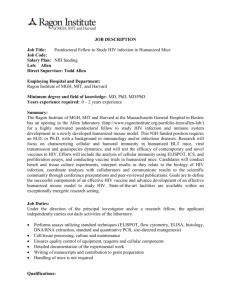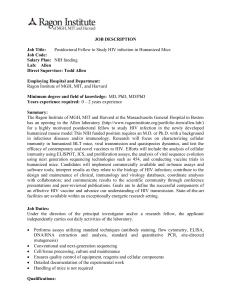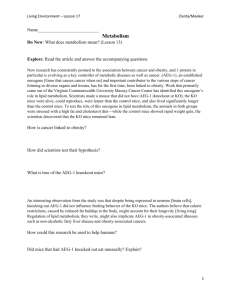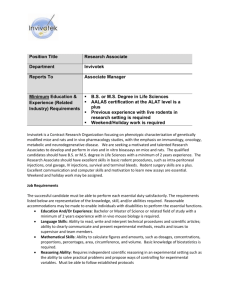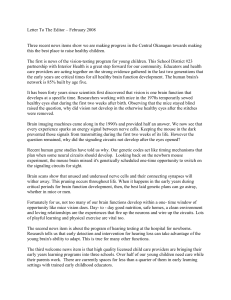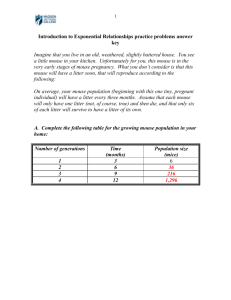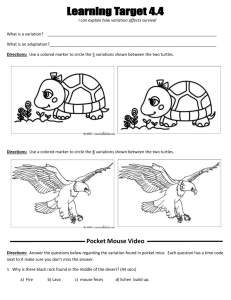YES - Delaware Valley Drug Metabolism Discussion Group
advertisement
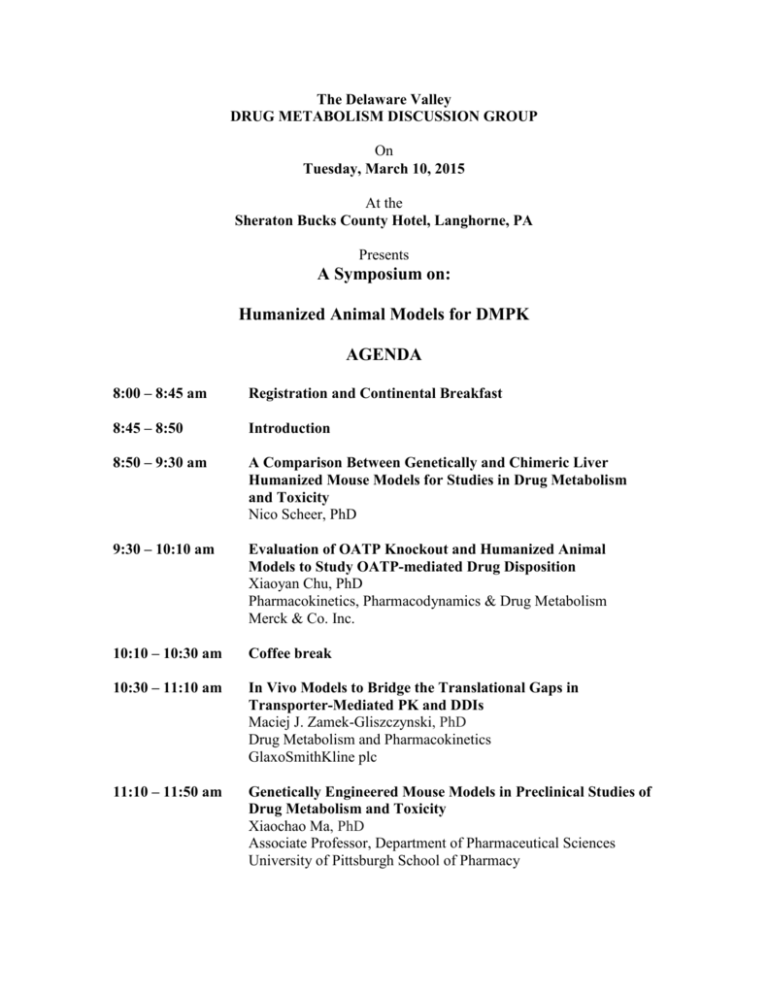
The Delaware Valley DRUG METABOLISM DISCUSSION GROUP On Tuesday, March 10, 2015 At the Sheraton Bucks County Hotel, Langhorne, PA Presents A Symposium on: Humanized Animal Models for DMPK AGENDA 8:00 – 8:45 am Registration and Continental Breakfast 8:45 – 8:50 Introduction 8:50 – 9:30 am A Comparison Between Genetically and Chimeric Liver Humanized Mouse Models for Studies in Drug Metabolism and Toxicity Nico Scheer, PhD 9:30 – 10:10 am Evaluation of OATP Knockout and Humanized Animal Models to Study OATP-mediated Drug Disposition Xiaoyan Chu, PhD Pharmacokinetics, Pharmacodynamics & Drug Metabolism Merck & Co. Inc. 10:10 – 10:30 am Coffee break 10:30 – 11:10 am In Vivo Models to Bridge the Translational Gaps in Transporter-Mediated PK and DDIs Maciej J. Zamek-Gliszczynski, PhD Drug Metabolism and Pharmacokinetics GlaxoSmithKline plc 11:10 – 11:50 am Genetically Engineered Mouse Models in Preclinical Studies of Drug Metabolism and Toxicity Xiaochao Ma, PhD Associate Professor, Department of Pharmaceutical Sciences University of Pittsburgh School of Pharmacy 11:50 - 1:10 pm Lunch 1:10 – 1:50 pm Genetically Engineered Rat Models in Preclinical Research of Drug Metabolism and Toxicity Edward Weinstein, PhD SAGE Research Labs 1:50 – 2:30 pm Humanized Mice (FcRn-tg, FcγR-hu) for Investigating Antibody PK and Fc Functions Susan Tam, MSc Principal Scientist, Fc Engineering-Structural Biology Group Biologics Research, Janssen Research & Development 2:30 – 2:50 pm Break 2:50 – 3:30 pm Liver Humanized Mice – Models for Metabolism and Toxicology Lisa Wilson, BS Senior Scientist Yecuris Corporation 3:30 – 4:00 pm Round Table Discussion Nico Scheer, PhD, received his PhD in Developmental Biology from University of Cologne, Germany. Until recently he was Head of the tADMET™ portfolio and Director of Business Development at Taconic Biosciences, where he established and managed a toolbox of translational mouse models and in vitro tools to better predict clinical outcomes in pharmacokinetics, drug-drug interaction and drug-induced toxicity. Nico now works as an independent consultant and he has published several papers in peerreviewed scientific journals in the field. Abstract: A Comparison Between Genetically and Chimeric Liver Humanized Mouse Models for Studies in Drug Metabolism and Toxicity Genetically humanized mice for proteins involved in drug metabolism and toxicity and mice engrafted with human hepatocytes are emerging and promising in vivo models for an improved prediction of the pharmacokinetic, drug-drug interaction and safety characteristics of compounds in humans. Their specific advantages and disadvantages should be carefully considered when using these models for studies in drug discovery and development. This talk gives an overview on the corresponding genetically and chimeric liver humanized mouse models described to date and it provides examples for their utility in drug metabolism and toxicity studies. It compares the strengths and weaknesses of the two different approaches, provides guidance for the selection of the appropriate model for various applications and discusses future trends and perspectives. Xiaoyan Chu, PhD, is a Senior Principal Scientist in the Department of Pharmacokinetics, Pharmacodynamics & Drug Metabolism (PPDM), Merck & Co. Inc., Rahway, NJ. She received her PhD from the Department of Molecular Pharmacokinetics, Graduate School of Pharmaceutical Sciences, University of Tokyo, Japan. After completing her post-doctoral research at the Department of Pharmaceutical Sciences, College of Pharmacy, University of Michigan, she joined the Department of PPDM at Merck & Co. Currently, her main responsibilities are to develop and lead transporter strategies to support Merck discovery and development programs, and to evaluate and establish new technologies to study the role of drug transporters in drug disposition and drug-drug interactions. She has over 40 original publications in the area of membrane transporters and pharmacokinetics, and is the invited speaker, organizer and steering committee member of scientific meetings/organizations. Abstract: Evaluation of OATP Knockout and Humanized Animal Models to Study OATP-mediated Drug Disposition OATP1B are major human hepatic uptake transporters that play important roles in the disposition and elimination of many clinically used drugs. Currently, predicting the impact of OATP1B on pharmacokinetics and DDI based on in vitro data alone is often limited by lack of confidence in in vitro to in vivo extrapolation and the multiplicity of transporters involved in the elimination of OATP1B substrates. Preclinical animal models therefore could be useful to bridge such translational gaps. However, overlapping substrate specificity between OATP/Oatp isoforms makes it difficult to understand the role of Oatps in single gene knockout models. Furthermore, there are no direct orthologs between rodent and human OATPs/Oatps. To overcome these limitations, Oatp1a/1b knockout and OATP1B1 and -1B3 humanized animal models have been established. In this presentation, the characterization of Oatp1a/1b knockout and humanized OATP1B animal models will be presented and the rational application and limitations of animal models to study OATP-mediated pharmacokinetics and DDIs will be discussed. Maciej Zamek-Gliszczynski, PhD, has a decade of industry (Eli Lilly and GSK) experience in supporting DMPK and PK/PD aspects of oncology, endocrine, and infectious disease programs at all stages between discovery and late-stage clinical development. He is currently leading the transporter strategy for support of the GSK portfolio. His research is focused on clinical PK/PD and DDI implications of drug and metabolite transport. Dr. Zamek-Gliszczynski is the author of over 40 manuscripts (>2,300 cites, h-index = 22) and over 60 presentations on this subject. He serves on the editorial board of Pharmaceutical Research, International Transport Consortium (ITC) steering committee, American Association of Pharmaceutical Scientists (AAPS) PK/PD/Drug Metabolism (PPDM) section executive council (vice-chair, 2015; chair, 2017), and he was the past chair of AAPS Drug Transport Focus Group. He was a coorganizer of the past five AAPS Workshops on Drug Transporters in ADME and two ITC Workshops. Dr. Zamek-Gliszczynski is also an adjunct professor at the University of North Carolina, Eshelman School of Pharmacy, where he lectures in the graduate-level PK/PD course and serves as external advisor on dissertation committees. Abstract: In Vivo Models to Bridge the Translational Gaps in TransporterMediated PK and DDIs In vivo transporter models have proven utility in bridging the in vitro-to-clinical translational gap by contextualizing in vitro transporter substrate interactions in terms of in vivo pharmacokinetics. This presentation will focus on the fraction excreted (Fe) data analysis approach. Four specific aspects of Fe-based analysis in transporterknockout/humanized models will be covered: 1) Metabolite transport as experimental support for Fe approach 2) Fe description of hepatic OATP uptake and Fe-based estimation of OATP1B1 contribution to hepatic uptake 3) Fe description of efflux-limited CNS distribution and explanation why is clinical modulation of BBB efflux unlikely? 4) Fe sheds additional insight into metformin PK/PD and DDIs Xiaochao Ma, PhD, is an Associate Professor in the Department of Pharmaceutical Sciences, University of Pittsburgh School of Pharmacy. He obtained his PhD in Pharmacology and Toxicology from Shanghai Institute of Materia Medica, Chinese Academy of Sciences in 2003. From there, he went to NIH and completed his postdoctoral training in Dr. Frank J. Gonzalez’ laboratory in 2008. Afterward, he worked as an Assistant Professor at University of Kansas Medical Center, until he joined the faculty at the University of Pittsburgh in 2013. Dr. Ma’s research focuses on the role of nuclear receptors in drug-drug interactions and adverse drug reactions. Dr. Ma uses genetically engineered mouse models and metabolomics in his research. He has published over 40 peer-reviewed articles. Research in Dr. Ma’s laboratory is supported by NIH. Abstract: Genetically Engineered Mouse Models in Preclinical Studies of Drug Metabolism and Toxicity Genetically-engineered mouse models, including gene knockout and transgene models, have been widely used for preclinical studies on ADMET. A gene knockout mouse model can serve as an ideal tool to investigate the role of a specific gene in ADMET of a drug candidate. In addition, humanized mouse models can be generated on the background of gene knockout mice, which can be used to overcome the species differences in ADMET. The current presentation will highlight mouse models of the pregnane X receptor and cytochromes P450 3A. The limitations of mouse models for preclinical studies will also be discussed. Edward Weinstein, PhD, is the Senior Vice President of Horizon Discovery where he oversees all in vitro and in vivo service offerings. He was a cofounder and President of SAGE Labs, where he managed a state-of-the-art facility dedicated to creation of genetically engineered mouse, rat and rabbit models designed for research use. Prior to this position, Edward served as Manager of Operations for Functional Genomics in the Research Biotechnology business unit of Sigma-Aldrich. Before joining Sigma, he performed basic research within the pharmaceutical industry. Edward had responsibility for the Molecular Profiling portfolio within Merck’s oncology franchise. His work there centered on discovery of new therapeutic targets as well as biomarkers for drug safety and efficacy. At Pfizer, Edward worked on development of several therapeutic targets, developing mouse models for breast and colon carcinoma. Edward received his Masters of Medical Science from Harvard Medical School and his PhD in Genetics from Harvard University where his research focused on mouse models of mammary gland carcinoma. Throughout his career Edward has focused on the application of animal models for the elucidation of mechanisms of complex disease processes. Abstract: Genetically Engineered Rat Models in Preclinical Research of Drug Metabolism and Toxicity The rat, rabbit, zebrafish, and pig have long been important experimental models in multiple fields of study. Unlike the mouse, efficient gene targeting in these species has remained a near impossibility with researchers forced to rely on random methods of mutagenesis. Using the zinc finger nuclease and the CRISPR/Cas9 technologies we have circumvented the need for embryonic stem cells and directly targeted genes in the fertilized embryo. Data will be presented on the creation and characterization of genetically engineered rats where key genes have been removed from the genome. Data will be shown for a panel of drug transporter knockout rats, with deletions in Mdr1a, BCRP and Mrp2. Characterization will also be provided for “knock-in” rat models where the endogenous gene for PXR, CAR and AHR have been deleted and replaced with the human orthologs. These humanized models hold promise for more predictive drug metabolism and toxicity research. Susan Tam, MSc, is a Principal Scientist in the Fc Engineering-Structural Biology Group within Biologics Research at Janssen R&D at Spring House, PA. She received her BSc at UC Berkeley and MSc at UC Riverside & UCLA in Cell & Molecular Biology. She worked for academics in plant genetics, and then for Centocor in antibody research. Centocor was eventually acquired by Johnson & Johnson, so currently, Susan has about 30 years experience at her company. Her main role is doing exploratory research with novel Fc molecules for therapeutics. She utilizes a number of rodent models for her studies. Abstract: Humanized Mice (FcRn-tg, FcγR-hu) for Investigating Antibody PK and Fc Functions Humanized mice are important for characterization of antibodies for therapeutic drugs. Three humanized mouse models will be described along with examples. The role of the neonatal receptor (FcRn) in prolonging the half-lives of IgG antibodies in vivo is well known. Human FcRn-transgenic mice (licensed from Jackson Labs) were used to evaluate antibody PK, and based on many studies, hemizygous Tg32 mice appeared to offer potential as a predictive rodent model for human PK. FcγR-hu mice that lack mouse FcγRs and are transgenic for five human FcγRs: CD16a, CD16b, CD32a, CD32b and CD64 (licensed from Rockefeller Univ.) were used to evaluate T cell activation and B cell depletion by a panel of Fc variants. The FcγR-hu mice could be used also to evaluate antibody efficacy in a syngeneic tumor model involving mouse (B16F10) melanomas. NSGS mice (immunodeficient NSG mice transgenic for 3 human cytokines that support myeloid cell development from Jackson Labs) are being used in pilot studies for evaluation of neutrophil-mediated cytotoxicity. While in various stages of validation, these models appear to be highly relevant tools for evaluating Fc-containing molecules. Lisa Wilson, BS, received her BS in Microbiology from Oregon State University and has over thirty years of research experience in molecular and cell biology. She has a broad range of expertise including recombinant virus technology, cell and molecular biology, primary and stem cell technologies, protein production and purification, antibody development, and chimeric animal technologies. Ms. Wilson is well published in the areas of Insulin-like growth factors, Akt, and the use of siRNA in maturation processes. She has presented as an academic researcher at numerous international meetings spanning broad subject matter, and presents globally on the novel use of chimeric technologies in primary cell molecular biology applications. Ms. Wilson has held industry appointments in Research and Development and currently holds the position of Senior Scientist at Yecuris Corporation where she serves as Study Director and oversees management of Research & Development programs. Abstract: Liver Humanized Mice – Models for Metabolism and Toxicology The liver is the site of many metabolic processes, including the metabolism of xenobiotics. Drug metabolism is phenotypically specific and can vary significantly between individuals of the same species. To date no reliable in vivo system capable of predicting the human-specific metabolic conversion of candidate small molecules exists. Rodents and other animal models often fail to provide information relevant to the human clinical outcome. Therefore, many promising pharmaceutical compounds fail only when they are tested in human subjects in phase I clinical trials. Yecuris Corporation has developed an in vivo genetic selection system, the FRG® KO mouse that permits extensive humanization of murine liver by transplanted human hepatocytes. The ability to routinely achieve >90% human hepatocyte replacement in the murine liver yields a model where human specific metabolism may be observed from a systems biology perspective. In addition, Yecuris has generated the FRG® KO/NOD strain to allow for the production of a dual humanized mouse model by transplantation with human hematopoietic stem cells along with the humanized liver. Many pathophysiologic processes involve both the liver and the hematolymphoid system. Examples include hepatitis C/HIV co-infection, immune mediated liver diseases, liver injuries with inflammation such as steatohepatitis and alcoholic liver disease, idiosyncratic drug responses, development of biologics, among many other applications. The dual humanized FRG® KO/NOD mouse will provide an essential tool for the study and treatment of these diseases. Regulatory agencies in the US, Europe and Japan demand extensive in vitro testing of all potential pharmaceuticals on cultured human hepatocytes in preclinical drug development. Hepatocytes are used for multiple important endpoints of clinical relevance. The availability of high quality human hepatocytes for these mandated studies is severely limited and is likely to become further restricted in the future. The FRG® KO technologies provide a potential solution to the current supply constraint by generating large amounts of high quality human hepatocytes in vivo. This technology promises to permanently overcome the supply constraint in high quality, tissue culture grade human hepatocytes. In summary, the humanized FRG® KO model will provide an in vivo platform for the determination of human specific metabolism, exploration of safety assessment, examination of drug-drug interactions and other parameters needed in validating new pharmaceutical compounds. In addition, the model provides a biological system for the expansion of high quality human hepatocytes that can be serially propagated, thereby alleviating the use of limited and often inferior hepatocytes for in vitro testing.
